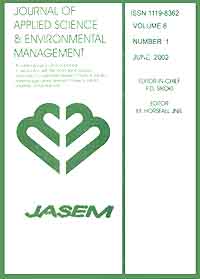
|
Journal of Applied Sciences and Environmental Management
World Bank assisted National Agricultural Research Project (NARP) - University of Port Harcourt
ISSN: 1119-8362
Vol. 22, No. 6, 2018, pp. 959-965
|
 Bioline Code: ja18164
Bioline Code: ja18164
Full paper language: English
Document type: Research Article
Document available free of charge
|
|
|
Journal of Applied Sciences and Environmental Management, Vol. 22, No. 6, 2018, pp. 959-965
| en |
D-3-O-methylchiroinositol (from Pilostigma thonningii  ) ameliorates cadmium chloride (CdCl2)-induced toxicity in male reproduction ) ameliorates cadmium chloride (CdCl2)-induced toxicity in male reproduction
UWAGIE-ERO, EA; NWAEHUJOR, CO; ABIAEZUTE, CN; OCHEJA, OB; EKEOLU, OK & ASUZU, IU
Abstract
This study examined the possible protective effect of D-3-O-methylchiroinositol isolated from stem
bark of Pilostigma thonningii on cadmium chloride (CdCl2)-induced reproductive toxicity in male Wistar rats. The results
show that the immotile, headless and sluggish sperm count decreased from Month 2 to Month 3 respectively in the CdCl2-challenged but D-3-O-methylchiroinositol-treated groups, and increased in the CdCl2-only groups from Month 1 to Month
3. Cadmium (Cd) accumulated in the testes of Wistar rats and decreased sperm morphology including sperm count, sperm
motility. It also increased immotile sperm count, headless sperm count and sluggish sperm count. However, in this study,
D-3-O-methylchiroinositol which has a structural formula similar to the phosphatidylinositol phosphate with proven
antioxidant potentials reversed these toxic effects by months 2 and 3. Histopathology results revealed that CdCl2
significantly reduced the volume of spermatozoa in the seminiferous tubules and resulted in reduced spermatogenesis
however, amelioration with D-3-O-methylchiroinositol restored the testicles to normal spermatogenic activities.
Keywords
D-3-O-methylchiroinositol, cadmium chloride (CdCl2); toxicity; Wistar rats; male reproduction
|
| |
© Copyright 2018 - Uwagie-Ero et al.
|
|
